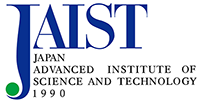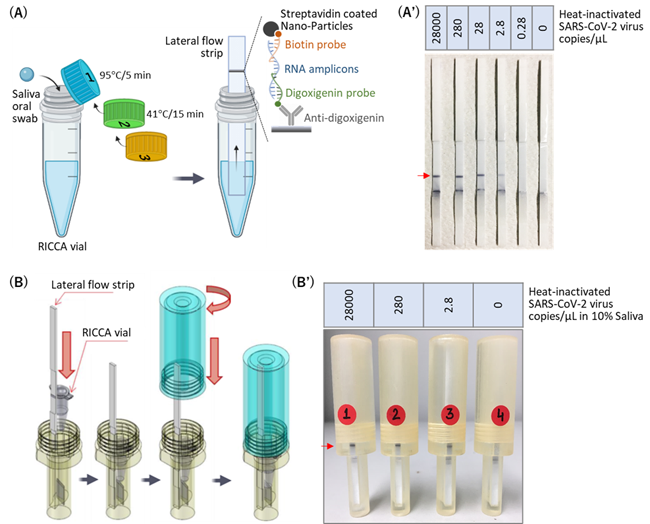RICCA: A 'Lab-free, Lab-quality' testing of RNA viruses to prepare for next pandemic

![]()
A team of scientists in Japan develop an advanced isothermal (one-temperature) nucleic acid amplification assay, termed 'RICCA Test', that can detect low viral loads of SARS-CoV-2 directly from saliva with a total assay time of 15-30 min and without the need for laboratory processing.
Key silent features of'RICCA test':
- One-pot isothermal RNA and DNA amplification reaction at 41°C (instrument-free)
- Rapid and high-sensitive (detect as similar as RT-PCR)
- Simple and instant detection (lateral flow strip)
- Ultra cost-effective (estimated running cost <500 Yen per test)
With the rapid emergence of new infectious virus strains that result in rapid outbreaks (such as 4 variants of concern (VOCs) of SARS-CoV-2 from Alpha to Delta and 5 variants of interest (VOIs) of SARS-CoV-2 from Eta to Mu that spread worldwide within months), the availability of rapid, sensitive, and reliable test of COVID-19 is essential for controlling the disease and thus the pandemic. This is the first COVID-19 related study from JAIST-originated venture BioSeeds Corporation that report instant and low-cost isothermal nucleic acids amplification method for COVID-19 that consists of a simple one-pot format of 'sample-in and result-out' with a primary focus on detection of low copy number of RNA virus directly from saliva and without the need of sending the sample in a laboratory. The team is now establishing to utilize and extend the application of RICCA system to detect COVID-19 and other infectious disease for on-site and mass testing in developing countries.
In order to stop the COVID-19 transmission further, the most effective way is the identification and isolation of infected suspects (symptomatic or asymptomatic). In the current global wave of COVID-19, RT-PCR testing is primarily performed. However, this laboratory-based testing method faces an arduous challenge to reach mass usage because of the requirements of sample processing in a laboratory and bulky expensive instrumentations (thermal cyclers with fluorometry) which limit the application for RT-PCR testing in the field. In order to get PCR-similar molecular testing, various isothermal (single-temperature) nucleic acid amplification assays are currently being used like LAMP (Loop-mediated Isothermal Amplification) and SDA (Strand Displacement Amplification). Although urging, these methods are reported to have lower specificity and sensitivity as compared to PCR tests. Also, most of the methods rely on tedious sample processing steps that includes in-lab viral RNA isolation, lysis, purification and then amplification.
To circumvent this issue, a team led by Prof. Manish Biyani from JAIST has developed a completely homogeneous, isothermal, highly sensitive, and ultrarapid method for detecting virus RNA target sequences for the on-site (low resource settings) molecular diagnosis of COVID-19 and other infectious diseases. Prof. Biyani termed this assay the RICCA (RNA Isothermal Co-assisted and Coupled Amplification) which is motivated by Japanese script RIKA (理科) which means 'easy science'. This advanced system RICCA can be particularly useful in developing countries where COVID-19 testing is a tedious process. Also, we can use this platform to test other infectious viral strains in the coming future. We have tested RICCA to differentiate alpha and delta variants of SARS-CoV-2, says Prof. Biyani. This latest study, which was published in Scientific Reports and showcased their strategy, conducted in collaboration with a team of scientists from Kyoto University (Prof. Kiyoshi Yasukawa), Osaka Women's and Children's Hospital (Prof. Itaru Yanagihara), Kwansei-Gakuin University (Prof. Shinsuke Fujiwara), Tohoku University (Prof. Eiichi Kodama) and JAIST (Prof. Biyani, Prof. Masahiro Takagi, Prof. Yuzuru Takamura).
The RICCA assay requires only a heat block and a tube prefilled with a mixture containing the necessary 25 reagents including four key enzymes and three key proteins to simultaneously perform RNA-specific and DNA-specific amplifications. The in-house reagents for RICCA test are easily accessible and ultra cost-effective and thus RICCA has the potential to decentralize COVID-19 molecular diagnosis to realize a 'lab-free, lab-quality' mega-testing platform. Following this, Prof. Biyani and team is now designing a robotic and mobile platform (a desk-top prototype is under development at BioSeeds Corp.) for RICCA which could be applied to taking COVID-19 diagnostics directly to consumers by mitigating the logistical burden of sample transport and could provide large-scale population testing in remote or resource-limited settings.

Figure: A novel RICCA assay for the lab-free, lab-quality testing of SARS-CoV-2 virus directly from saliva with a total assay time of 15-30 min. Schematic view of the assay (A) and detection of the heat-inactivated SARS-CoV-2 virus at concentrations ranging from 28,000 to 2.8 copies/μL (A'). Schematic view of the closed-system to perform RICCA assay for contamination-free diagnosis (B) and detection of the heat-inactivated SARS-CoV-2 virus in the presence of 10% human saliva (B').
Reference:
This work was supported in part by Adaptable and Seamless Technology Transfer Program through Target-driven R&D (A-STEP, No. JPMJTR20UU) from the Japan Science and Technology Agency (JST) of Japan, Emerging/re-emerging infectious disease project of Japan (JP20he0622020; JP20fk0108143) from the Japan Agency for Medical Research and Development (AMED).
| Title of original paper | Development of robust isothermal RNA amplification assay for lab-free testing of RNA viruses |
| Journal | Scientific Reports |
| Author | Radhika Biyani, Kirti Sharma, Kenji Kojima, Madhu Biyani, Vishnu Sharma, Tarun Kumawat, Kevin Maafu Juma, Itaru Yanagihara, Shinsuke Fujiwara, Eiichi Kodama, Yuzuru Takamura, Masahiro Takagi, Kiyoshi Yasukawa and Manish Biyani |
| Online published date | August 6, 2021 |
| DOI | https://doi.org/10.1038/s41598-021-95411-x |
| Shortened URL | https://rdcu.be/csHKP |
September 8 ,2021
